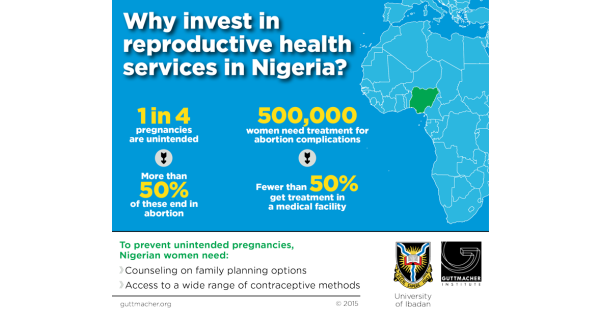The Importance of Sexual and Reproductive Health and Rights (SRHR) in Nigeria
Sexual and reproductive health and rights (SRHR) play a vital role in achieving several Sustainable Development Goals (SDGs), especially those focused on good health and wellbeing, quality education, gender equality, and reduced inequalities. In Nigeria, the urgency of SRHR is heightened by its young population, which makes up approximately 70% of the country’s total population. Despite this demographic advantage, access to modern contraceptives and youth-friendly SRHR services remains limited.
According to the 2023 Nigeria Demographic and Health Survey (NDHS), the modern contraceptive prevalence rate (mCPR) among married women is only 14%, while it is just 3.3% among adolescent girls aged 15-19. The unmet need for family planning is particularly high, with 15.8% among adolescents aged 15-19, rising to 21% among women aged 20-24 and 22% among those aged 30-34. These statistics highlight the pressing need for improved access to SRHR services across the country.
Economic Implications of Family Planning
At a recent policy dialogue themed “Closing Reproductive Health Impact Gaps: Strategic Approaches for Equity and Access,” stakeholders discussed the challenges and strategies to strengthen equitable access to SRHR products and services in Nigeria. Vivianne Ihekweazu, Managing Director at Nigeria Health Watch, emphasized that SRHR is not only a health issue but also an economic imperative. She noted that for every additional US$1 invested in meeting the unmet need for modern contraception, healthcare costs are reduced by US$3. Universal Health Coverage cannot be achieved without universal SRHR access, as better maternal health, higher school completion rates, and a more resilient economy all depend on this integration.
The rapid growth in Nigeria’s population, without corresponding investment in SRHR and education, deepens poverty, restricts women’s ability to make informed decisions about their family size, and places greater strain on national budgets. Young people continue to face multiple barriers, including limited knowledge of contraceptive services, social stigma, inadequate access to youth-friendly services, poor attitudes among healthcare providers, and a lack of confidentiality when seeking SRHR products and services.
Funding Challenges and Domestic Innovation
Despite these challenges, Nigeria’s national family planning budget has been drastically reduced from ₦2.225 billion allocated in 2024 to ₦66.39 million in 2025. This funding shortfall exacerbates commodity stock-outs, restricts youth-friendly services, and threatens progress towards achieving the country’s FP2030 commitments. It is essential to shift conversations around SRHR from seeing it as a cost to recognizing it as a driver of economic resilience and national productivity.
Dr Binyerem Ukaire, Director of the Department of Family Health at the Federal Ministry of Health and Social Welfare, highlighted the government’s efforts to bridge funding gaps and improve family planning outcomes. Through the Presidential Initiative for Unlocking the Healthcare Value Chain, the Medipool is deploying 6 million U.S dollars for procurement of family planning products and ensuring good logistics supply management systems for these commodities.
Domestic financing for SRHR is critical to guarantee sustainable access to essential services. Kano State has made significant progress by allocating a portion of the Kano State Health Trust Fund, which pools contributions from all 44 local governments and internally generated revenue. Ogun State, however, receives only $0.04 per capita in donor support, compared to Kano’s $1.07. Dr Tomi Coker, the Commissioner for Health, Ogun State, emphasized the state’s commitment to financial independence, stating that the Basic Health Care Provision Fund is a crucial resource.
Overcoming Systemic Barriers
Despite these initiatives, systemic barriers to accessing SRHR products and services persist. Procurement delays and fragmented supply chains often result in stock-outs, affecting health facilities and undermining both service quality and public trust. Dr. Taiwo, Country Director of The Challenge Initiative (TCI) Nigeria, noted that the existence of a budget line does not guarantee that funds will be approved, released, or effectively utilized.
Improving access to youth-friendly sexual and reproductive health (SRH) services requires layered, context-specific innovations. Examples include the Machakos Youth Drop-in Centre in Kenya, which provides a judgment-free environment, and Healthtracka’s “Lemon kit,” which helps young women screen for STIs without stigma. Expanding comprehensive sexuality education, both within and beyond school settings, is crucial to empower young people with accurate information about their sexual and reproductive health and rights.
The Role of Digital Tools and Multi-Stakeholder Partnerships
Digital tools are also vital in expanding access and ensuring confidentiality. By leveraging online platforms, it is possible to broaden reach, provide reliable information, and counter misinformation. Dr. Fatima Bunza, Country Director of Tiko Nigeria, emphasized the importance of combining high-tech, low-tech, and no-tech solutions to reach diverse youth populations. Physical Tiko cards distributed by trained community mobilisers provide access for girls without mobile phones, enabling them to enroll in and benefit from SRHR services.
With donor support declining and Nigeria’s population projected to nearly double by 2050, investing in SRHR has never been more critical. Failure to act risks deepening poverty, increasing maternal and child mortality, and preventing millions of young people from realizing their reproductive rights. By scaling proven approaches such as domestic financing models, inclusive multi-stakeholder partnerships, and youth-driven program design, Nigeria can make significant progress and achieve its FP2030 commitments. This shift would move SRHR beyond donor dependency, positioning it as a powerful driver for economic growth and social development.
 Info Malang Raya Its All About World News
Info Malang Raya Its All About World News




